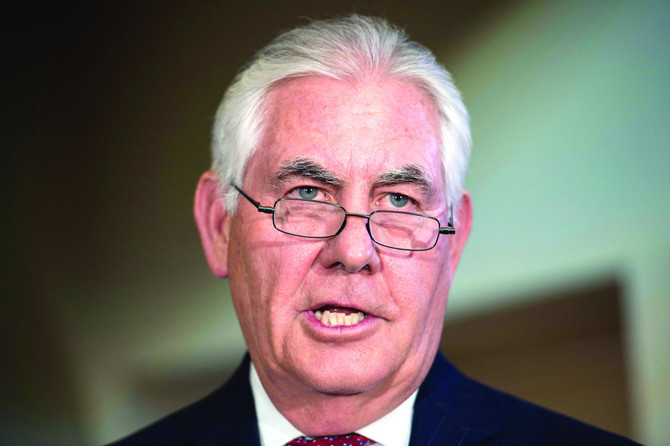Jeddah: US President Donald Trump is pondering whether moving the US Embassy in Israel from Tel Aviv to Jerusalem would help or hurt the prospect of an Israeli-Palestinian peace deal, Secretary of State Rex Tillerson said Sunday, revealing the criteria Trump is following to reach a decision that will no doubt reverberate throughout the volatile Middle East.
“The president is being very careful to understand how such a decision would impact the peace process,” Tillerson said in an interview broadcast Sunday on NBC’s “Meet the Press.”
While the Israelis seemed dismayed by the new development, the Palestinians said it is a step in the right decision, one that has the potential to increase the chance of having peace negations resume between Palestinians and Israelis.
“We have been saying that we are willing to engage in peace talks and are ready to cooperate with Trump in his efforts to make a peace deal with the Israelis possible on the basis of the Arab Peace Initiative and the relevant international covenants,” Nabil Abu Rudeineh, Palestinian President Mahmoud Abbas’ spokesman, told Arab News on Sunday.
“We welcome this new development and we are optimistic about the upcoming visit of the US president to Palestine, where he is expected to visit Bethlehem and meet with President Abbas. We want to see our country established on our sovereign territories with East Jerusalem as our state’s capital,” Abu Rudeineh said.
Israeli Prime Minister Netanyahu, on the other hand, said in a statement that moving the US Embassy to Jerusalem would not harm the peace process, adding that he made his views in this regard clear during his previous meeting with the Trump administration.
Since taking office, Trump has backed away from his campaign pledge to move the embassy to Jerusalem, saying now that he is still studying the issue.
Tillerson linked Trump’s deliberations directly with his aspiration to broker peace in the Middle East.
He said Trump’s decision would be informed by feedback from all sides, including “whether Israel views it as helpful to a peace initiative or perhaps a distraction.”
As Trump prepares to depart Friday on his first foreign trip, his decision will be closely watched.
After stopping in Saudi Arabia, Trump will visit both Israel and the Palestinian territories, in a bid to strike the Israeli-Palestinian deal that has eluded his predecessors.
The status of Jerusalem is one of the most emotionally charged issues in the conflict between Palestinians and Israelis, with both sides laying claim to this city holy to all monotheistic religions.
Israel captured east Jerusalem — where Palestinians want to establish the capital of a future independent state — from Jordan in 1967 and annexed it, a move not internationally recognized.
In another sign that the White House is proceeding cautiously, David Friedman, Trump’s ambassador to Israel, plans to work out of the current embassy in Tel Aviv rather than out of the US Consulate in Jerusalem, as some had urged him to do.
Friedman, who owns an apartment in Jerusalem, is expected to live in the US ambassador’s official residence in the Tel Aviv suburb of Herziliya.
Palestinians argue that moving the embassy would prejudge one of the most sensitive issues in the conflict and undermine America’s status as an effective mediator.
There have been some signs that the Israeli government, while publicly supporting moving the embassy, has quietly raised concerns that doing so could enflame the political and security situation.




























